Key takeaways:
- Understanding a tool brand involves evaluating its quality, reliability, and the emotional connection associated with its history and values).
- Key features of quality tools include material quality, ergonomic design, versatility, precision, and warranty, enhancing user confidence and performance.
- Choosing a tool brand should be based on personal needs, workflow compatibility, and insights from user reviews and real-life experiences.
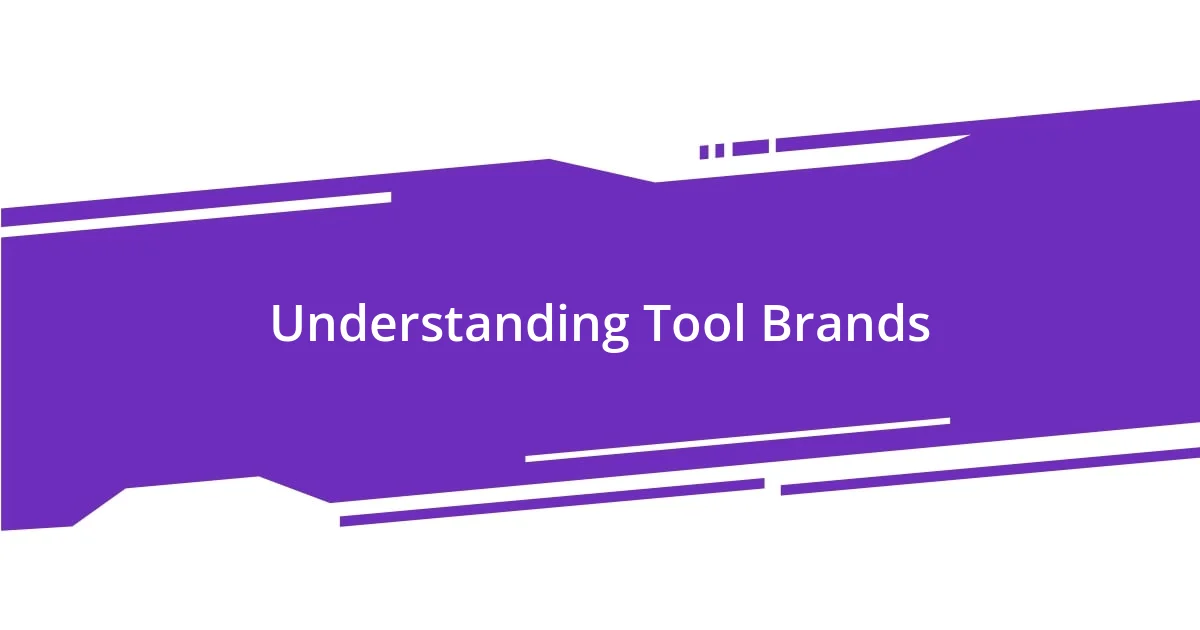
Understanding Tool Brands
When I first started exploring tool brands, I was overwhelmed by the sheer number of options available. I remember standing in the aisle, staring at brands with flashy packaging, wondering which one to trust. It made me realize that understanding a tool brand goes beyond just the logo or the price tag; it’s about the quality, reliability, and the stories behind each brand.
Each tool brand has its own identity and history, reflecting the values and aspirations of its creators. Take, for instance, the journey of some heritage brands that have been around for decades. Their commitment to craftsmanship resonates with me deeply; it reminds me of the way my grandfather cherished his tools, passing them down with pride. This emotional connection makes choosing a brand feel more like choosing a partner in my projects than just a simple transaction.
Have you ever thought about how a brand’s reputation affects your experience with their tools? For me, it’s fascinating to see how reviews and user experiences shape perceptions. I often find that brands known for their excellent customer service foster a sense of trust and loyalty, influencing my purchasing decisions. It’s a dynamic dance between perception and reality, and understanding it can help us make informed choices tailored to our needs.
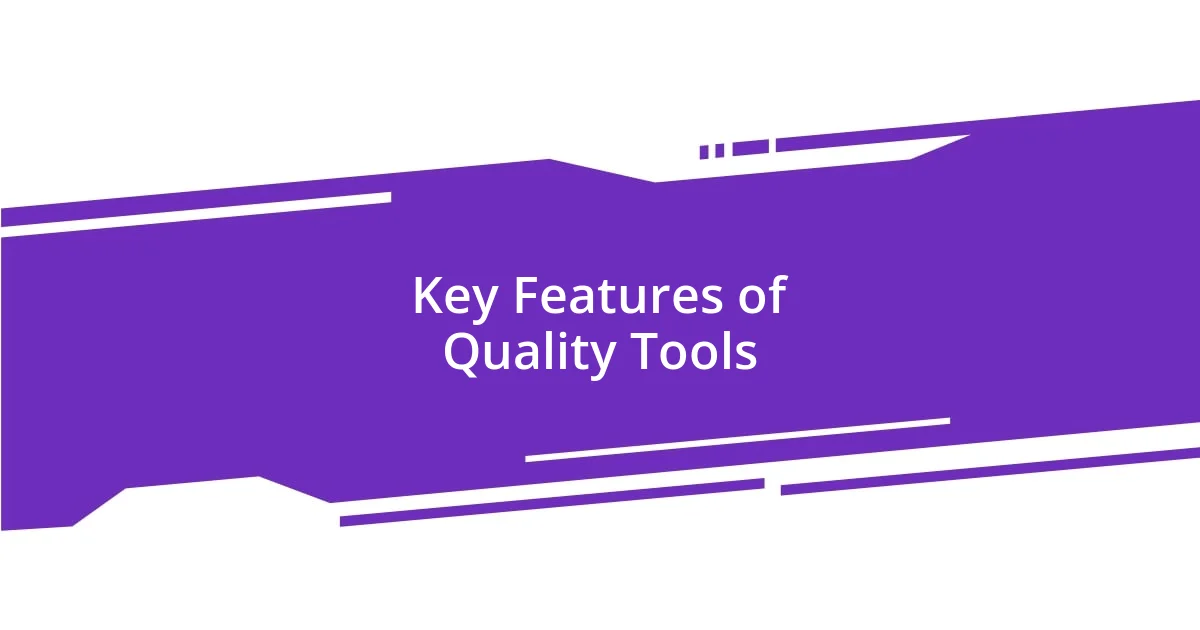
Key Features of Quality Tools
When I consider what makes a tool truly stand out, a few key features immediately come to mind. In my experience, the best tools are often distinguished by their durability and construction. I remember my first drill; it was a sturdy piece that took some serious abuse on various projects, yet it still outperformed my expectations long after my novice days were over.
Here are some essential features to look for in quality tools:
- Material Quality: High-grade materials enhance tool lifespan and performance.
- Ergonomic Design: A comfortable handle makes a world of difference during extended use.
- Versatility: Tools that serve multiple purposes save both space and money.
- Precision: Accuracy in design ensures better results in any task.
- Warranty and Support: A solid warranty reflects a manufacturer’s confidence in their product.
These features often not only improve performance but also add a layer of confidence in what I’m using. Knowing I can rely on a tool lets me focus on the task at hand instead of worrying about potential failures. Through my trial-and-error moments, I’ve come to value these attributes more than the flashy designs that tend to catch my eye.
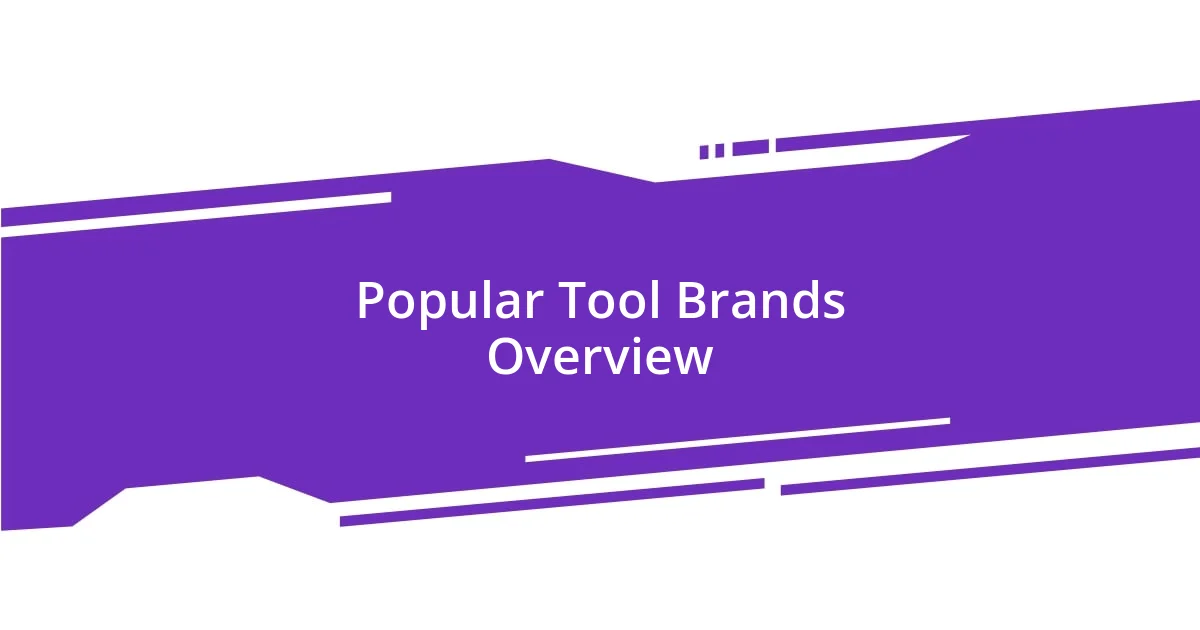
Popular Tool Brands Overview
When diving into the world of popular tool brands, I often find myself gravitating toward those with a clear commitment to innovation and quality. Brands like DeWalt and Milwaukee have built a reputation not just through marketing, but by consistently delivering tools that elevate the user experience. I recall experiencing my first impact driver—its power and performance made me feel like a pro, even though I was still learning. This brand loyalty stems from my hands-on experiences, which often outweigh others’ opinions.
As I compare some of the leading brands, I appreciate how each one has its unique strengths. For example, while Bosch excels in precision tools, Ryobi captures my attention with its affordability without sacrificing quality. The excitement of using a well-engineered tool feels like having a trusty partner by my side during challenging projects. Each tool has a story that resonates with the user, and that’s what makes my toolkit special—it’s not just about functionality, but also about the memories attached to each gadget.
I find it interesting how some brands cater to specific audiences, reflecting various needs and preferences. For instance, brands like Festool are often favored by professionals seeking unparalleled quality, whereas others like Black+Decker appeal to DIY enthusiasts looking for budget-friendly options. This variety allows me to select tools that not only match my project’s demands but also fit my budget and skill level seamlessly. Understanding what each brand offers enables me to make informed choices that align with my personal toolkit narrative.
| Brand | Key Strengths |
|---|---|
| DeWalt | Durability, Innovative Design |
| Milwaukee | Power, Reliability |
| Bosch | Precision Tools, Advanced Technology |
| Ryobi | Affordability, Versatility |
| Festool | Professional-grade Quality |
| Black+Decker | Budget-friendly, User-friendly Tools |
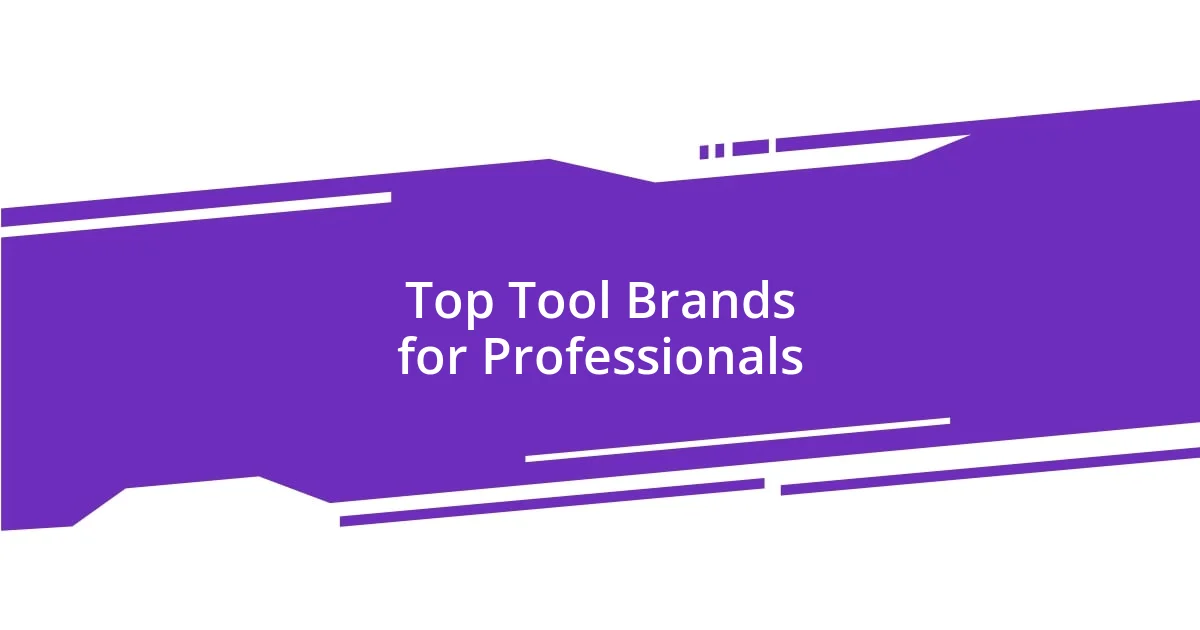
Top Tool Brands for Professionals
In the realm of professional tools, I can’t help but highlight DeWalt. Their products never let me down, and I vividly recall a time when I was knee-deep in a renovation project. It started to rain, and my trusty DeWalt drill was the only thing that kept working effortlessly, showing its reliability even in less-than-ideal conditions. Can you imagine how frustrating it would be if the tool you depended on failed in such moments?
Milwaukee also deserves a mention for their impressive range of power tools. I remember using their reciprocating saw during a particularly tough demo job. It cut through materials like butter, and I felt this rush of adrenaline knowing I could tackle anything with that level of power. Their tools have this raw energy that somehow makes even the most daunting tasks feel manageable. Don’t you think having that kind of confidence in your tools can transform your work experience?
Then there’s Bosch, which boasts some exceptional precision tools. I fondly recall using their laser level while installing cabinetry. The accuracy it offered made me feel like a seasoned pro, and I could see the difference it made in alignment. This experience reminded me how the right tool can elevate the entire project, turning what could be tedious work into a satisfying accomplishment. It made me wonder—how many professionals have unlocked their full potential simply by investing in quality tools?
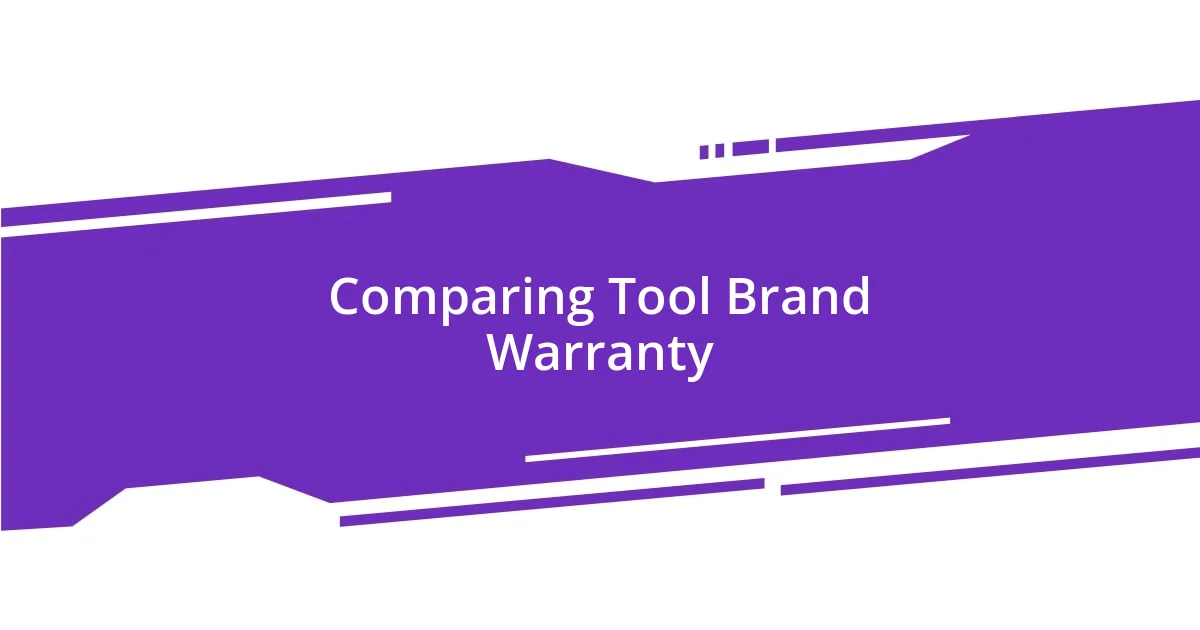
Comparing Tool Brand Warranty
When I think about tool brand warranties, several brands stand out for their robust assurance policies. DeWalt, for instance, offers an impressive three-year warranty on their products, which speaks to their confidence in durability. I remember purchasing my first DeWalt power tool, and that warranty gave me peace of mind, knowing I had backup if anything went wrong.
On the other hand, Milwaukee surprised me with their extended five-year warranty for certain tools. This level of support instills trust, especially when I’ve invested hard-earned money into reliable equipment. It raises the question—how much is a warranty worth to you? For me, it often separates a good tool from a great one.
Brands like Bosch take a different approach, often focusing on their exceptional performance rather than lengthy warranties. However, they still back their products with a standard one-year warranty. I once had a Bosch tool malfunction, and their customer service handled it smoothly, reinforcing my faith in their commitment. It made me realize that while the length of a warranty is essential, the quality of service can be just as important in ensuring a positive ownership experience.
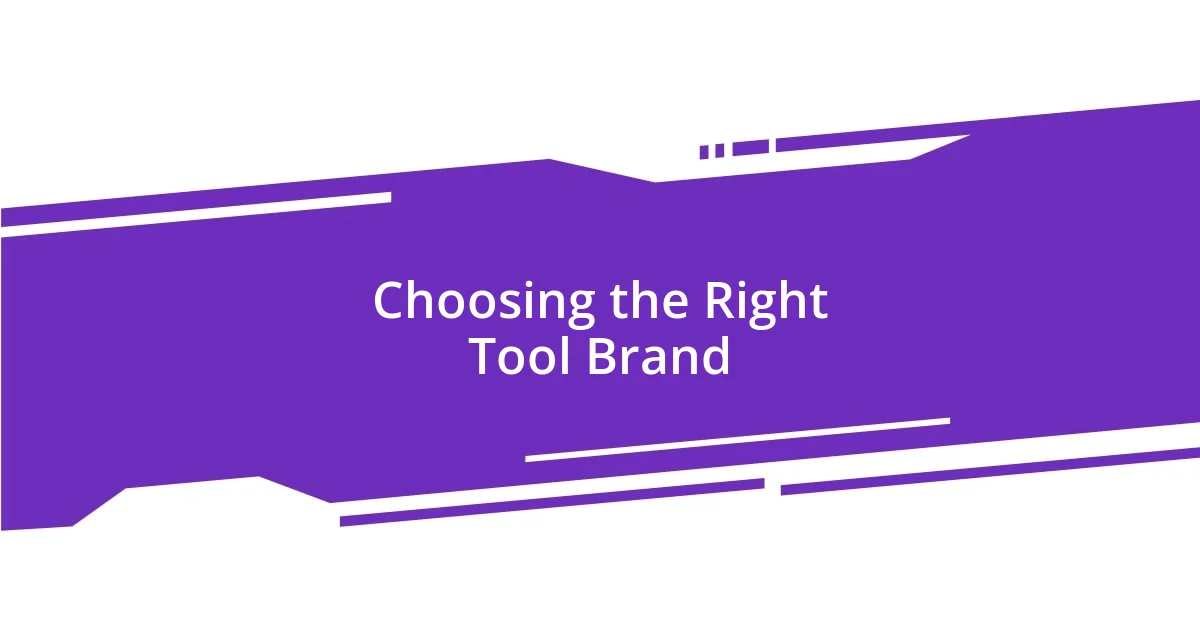
Choosing the Right Tool Brand
Choosing the right tool brand isn’t just about the tools themselves; it reflects your needs as a professional. I remember standing in a hardware store, overwhelmed by the choices. It hit me that I needed to consider my specific projects and work style to make an informed decision. Would I use the tools daily or just for occasional tasks? This reflection helped me narrow down brands that truly matched my work requirements.
Another aspect I focus on is how each brand resonates with my personal workflow. For instance, I tend to rely on tools that feel intuitive in my hands. I once switched from a brand with complex controls to one known for its ergonomic design. The difference was striking—I felt more efficient and, honestly, more confident in my work. How crucial is comfort and ease of use for you when tackling a project?
Lastly, I can’t stress enough the importance of researching user reviews and real-life experiences. If I find several professionals praising a particular brand for its longevity and performance, that makes a significant impression. I once hesitated to buy a new brand until I saw rave reviews about their after-sales service. It ultimately led me to invest in their tools, and what a game-changer that decision was! Don’t you find that tapping into the community’s feedback can guide you to the best choices?














